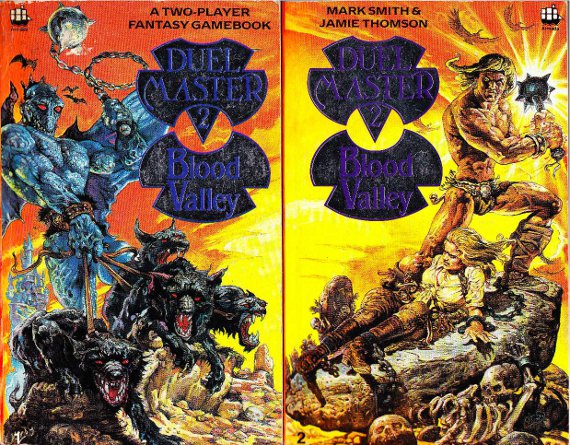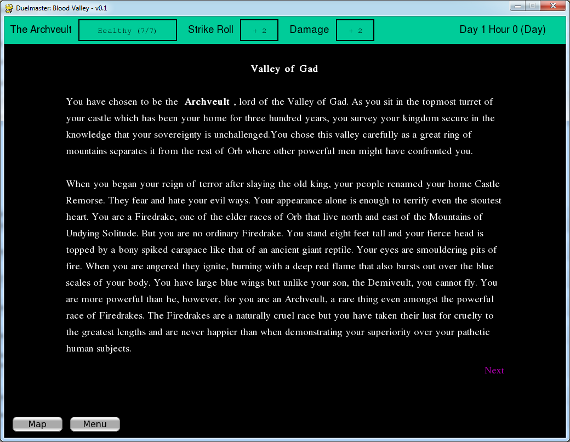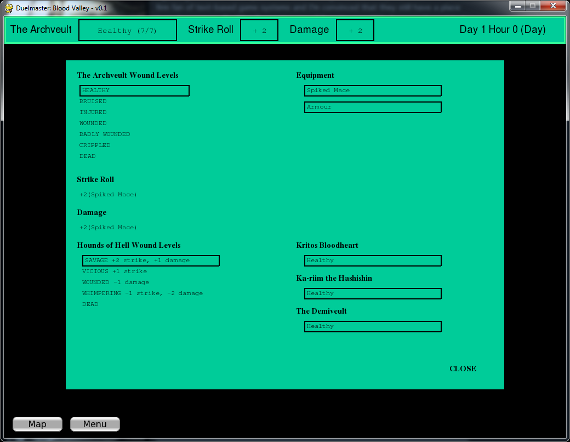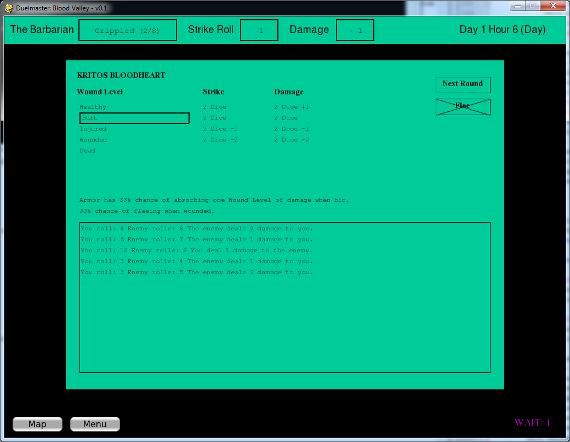
Like many gamers my age, I was introduced into the world of gaming by gamebooks. Not the simple Choose Your Own Adventure series or its many clones but the ones with rules and actual game mechanics. In my case, the library of my primary school in Kuala Lumpur, Malaysia, Chung Kwok Primary School, turned out to have a copy of Flight from the Dark, the first book of the Lone Wolf series. It was the only gamebook they had but it was enough to spark my imagination and eventually my Lone Wolf collection went up to Book 12 and I’d branched out into many other gamebook series as well.
Anyway I was recently surprised to discover that BGG actually includes one of my favorite of these books in its database, the Duelmaster series by Mark Smith and Jamie Thompson. These two writers are probably best known for their Way of the Tiger ninja assassin series, which I own as well. But the Duelmaster series is the only one of my childhood gamebooks that I still think about from time to time. They consist of a series of four titles, and each title comes with two books because this is actually a competitive two-player game. I know of other gamebooks that are designed for two-players but I believe that the Duelmaster books are the epitome of this little subgenre.
One reason they’re especially memorable to me is because I never could find anyone to play them with me properly so I mostly just thumbed through them by myself. But I’m also fond of them because they’re surprisingly rules-heavy and sophisticated for their time. As with other gamebooks, each player needs to use a character sheet to track health and possessions. But this series also uses a codeword recording system to coordinate events in the game, so if one player goes to a cave for example and picks up a sword there, the other player will find nothing when he visits the same cave. A WAIT system is used to synchronize the pace that both players traverse through the shared game world and more codewords are used to determine if the two players are at the same location at the same time, which naturally starts the epic duel that is the whole point of the series.
Beyond these similarities, I’m also impressed with how different each of the four titles in the series are. The first one, Challenge of the Magi, has the two players take on the roles of powerful mages who must duel each other across many planes of existence. You get to create your own mage, complete with which spells your mage knows and the game comes with a very neat paper map of the various planes and how they connect to each other. To my regret, my map was spoiled and lost many years ago. The spell combat system is very theatrical and atmospheric but relies on hard counters and instant kills, so I’d venture that it’s more fun to read than actually play.
The second title of the series, Blood Valley, illustrated above, is the most asymmetric of the four. One player takes on the role of an evil Firedrake who rules a valley and enjoys the annual ritual of hunting a human slave every year. The other player must play the slave. The game heavily favors the hunter in combat but the quarry can win just by successfully fleeing from the valley and need never fight the hunt. This title implements a day/night cycle as time passes in the game, a simple randomization system to place the exits from the valley and gives the hunter extensive tools (patrolling minions, traps etc.) to help track down the quarry. If the hunter and quarry do fight each other, the combat is conducted using a rock-paper-scissors system where each player secretly choose a combat move and dice rolls are then modified accordingly.
Shattered Realm is usually considered the worst of the series because it is the most linear, with very few choices to make, and it has a lot of errors in the text. Arguably it is also the most innovative of the bunch because it depicts a war between the two players. Each controls a country. The first half of the game has the players travel to neighboring realms to gather allies for the war. The second half involves simulating the big battle itself. Players can choose where to place their forces on the battlefield and whether to advance, hold or retreat their forces in each sector. It’s very ambitious but rather pointless now in the age of video games.
Most players consider the last title Arena of Death to be their favorite. The two players are gladiators who face each other in a giant arena, complete with a cavernous maze of catacombs beneath it populated by all manner of monsters. The cool part is that players may choose their gladiator from a variety of classes, such as knight, monk, amazon etc., each with different abilities and equipment. Player vs. player combat is quite detailed as you can target specific parts of the opponent’s body and even armor pieces are locational. Once again a randomization system is used to make the arena slightly different each time and there’s even a campaign system which allows victors to earn money to spend on better training and equipment.
I guess gamebooks seem quaint now that videogames are everywhere but I remain a firm fan of text-based game systems and I’m convinced that they still have a place in modern games. Darklands remains one of favorite ever RPGs because it used text to describe places and situations rather than try to convey everything through graphics. And I’m a big fan of Echo Bazaar which uses excellent writing to differentiate from the mass of other browser games. Plus I understand that dating RPGs are quite popular right now, and these consist almost entirely of text with only graphics for flavor.
Just for the fun of it, I’ve been tinkering with writing a Python version of Blood Valley as a single-player game with an AI controlling the opponent. I have to admit that I greatly underestimated the amount of work necessary so I’m not sure I’ll ever finish it. There are just too many special rules and situations to account for. But here are some teaser screenshots of what I’ve done so far:



7 Responses to “The Duelmaster Series”
nice post, reminds me of the nostalgic days of playing Avenger! and the mages in starships 🙂
and is phyton a difficult language to learn ? seems interesting and fun to be able to write games 🙂
keep up the great reviews ! and hope to meet you someday !
cheers !
Thanks for the comment! I always appreciate these. Too bad the Way of the Tiger series never ended. I have all of them up to Inferno! and the damn thing ends on a cliffhanger. Years later, when the world wide web took off, I discovered that they never release another book after Inferno! I was heartbroken.
Python is a very easy language to learn but probably not the best tool to learn to make games with. If you’re really interested, let me know and I’ll have some more fleshed out suggestions.
You’re most welcome ! yup, it was a special ending where avenger ends up in a spider web, different from lone wolf and grey star series where the hero survives and lives happily ever after, haha….sigh….guess its their call to end it that way.
i’m currently learning java thru code academy, online, though i must admit i’m not that persistent and hardworking, hehe…
maybe i can join you guys during your boardgame session, and we can chat more.
cheers !
Unfortunately I’m currently in Seremban, so not much boardgaming for me around here. I’ve never visited the code academy site before this but I have heard of it. Seems cool. I’m currently doing the online courses at coursera.org at the moment, but what really taught me programming was participating in the AI Challenges that I’ve posted about elsewhere in this blog.
ic….thanks for the link to coursera.org, will look into it. and will also check out the blog on AI.
cheers !
Duel Master was the greatest! Blood Valley and Arena of Death were undoubtedly the best gamebooks ever published. They were very well executed, with the system of codewords and so on. I’d definitely be up for playing a few rounds of Arena of Death for nostalgia’s sake!
(I’m working on a course on coursera as well, as it happens…)
Cool to hear from another fan of the Duel Master series. Too bad gamebooks are now dead because of videogames and some of you guys might want to check out the current crop of boardgames if you haven’t paid attention to the scene lately.
Leave a Reply